FORT POLK, La. -- The 83rd Chemical Battalion hosted "The Crucible," a three-day event for officers May 27-29, to train them to standard on Army tasks and drills. Lt. Col. Scott Estes, commander, 83rd Chem Bn, said the exercise expanded throughout the planning process. "This began as an idea for a defensive live fire exercise to show all of the battalion's officers what right looks like," he said. "As we began to talk, we got more ideas and expanded it to three days to get in a lot of training for the officers in a short period of time. It's a three-day officer professional development session."
"We're in the unique position of being the 1st Maneuver Enhancement Brigade rear," said Maj. Adam Hilburgh, executive officer, 83rd Chem. "Because of that we have a command relationship with the 519th Military Police Battalion and the 814th Engineer Company. We also have a training, readiness and authority relationship with two chemical companies at Fort Brag -- the 21st Chemical Company and the 101st Chemical Company."
Sixty officers, drawn from each of the units and organized into squads, participated in the event. "Because my company is at Fort Bragg, I don't get many chances to know my fellow company commanders, their platoon leaders or the battalion staff here at Fort Polk," said Capt. Stephen McKinney, commander, 21st Chem Co, Fort Bragg, N.C. "I've had a chance to spend more time with and get to know them."
The first day consisted of classes on Army tasks. The second day began with a road march to Honor Field, where the officers took a 400 point PT test (which included chin-ups). Immediately after the test, they began a land navigation course that consisted of 14 points spread across a 25 square-kilometer area. Each point on the course featured a different task that each squad had to complete before moving on. By the end of the second day, officers had marched at least 20 miles. On the third day the squads came together and constructed a platoon defensive position, which included digging chest-deep foxholes.
"We wanted the officers to work as teams on basic Soldier skills and validate that they know what right looks like," Hilburgh said. "We also want them to be both physically and mentally tough. If they can get through this, they can lead their Soldiers better."
Each officer led their squad during the exercise. "There's no chance for any of them to sit back and watch," Hilburgh said. "They can't tell a Soldier to set up an antenna or dig a bunker. The officer has to do it. There's no delegation at all -- that's a lot different than usual. Normally, when officers go to the field, they're coordinating and planning and the Soldiers and NCOs are executing. Now the officers are executing the tasks that they usually just plan."
Sgt. 1st Class Cleveland Bryant, 51st Chem Co, inspected the officers' equipment, graded the PT test and served as the NCO in charge of the platoon defense lane.
"This is a good exercise because the officers are doing what the Soldiers and NCOs do every time we go on a field training exercise," Bryant said. "You can lead Soldiers better if you know what they go through." Bryant said he was impressed with the officers' performance. "Despite the 20-mile march they completed yesterday, they are motivated."
"This was a lot to accomplish in three days," said Staff Sgt. Edward Smith, 51st Chem Co. "It tested their will. This event showed them the Soldiers' limitations. It's easy to talk about a plan, but once it is implemented, it's a different story."
The officers learned tangible lessons throughout the training. "Some of the squads traversed swamps based on their route selection, which wasn't planned for," Hilburgh said. "They got more wet than they needed to, but that was a learning experience, too. Route selection is important, especially over this distance. Every extra mile, every extra step, wears Soldiers down."
Second Lt. Justin Hill, Headquarters and Headquarters Detachment, 83rd Chem, has been recently assigned to the unit, after completing airborne and Ranger schools. "When I came to this battalion I didn't expect it to be this hard core," he said. "I was pleasantly surprised with the training. It's intense, compared to what most people would think. This is a combat support unit, and there is a negative stereotype of support units. This training shows that Soldiers are all the same."
The training was a review of common tasks for most of the officers, but for some, the intensity of the event was an introduction to the operational tempo of deployed units. "A lot of our basic Soldier skills are perishable," said McKinney. "I have gotten rusty on things I thought I had down pat. I think the intensity is good. Not all of the lieutenants have had the opportunity to deploy. In the combat zone, the operational tempo is non-stop. This gives a small snapshot of what things can be like (on deployments). The improvised explosive device lane was realistic. The Soldiers who operated it had good fieldcraft."
Hilburgh said several officers exceeded his expectations. "There are always those who you know will do well. But there were a lot of officers who stood out among their peers," he said. "Every one of the officers will be stronger when they go back to their units. When they tell a Soldier to do something, they know how long it takes and the wear and tear it puts on them. They get it now. You can read about it all day, but until you've done it yourself, you don't know."
Estes expressed his pride in the officers that participated. "They covered 20 miles with a rucksack that weighed at least 50 pounds and had positive attitudes throughout and got the job done," he said. "I am proud."
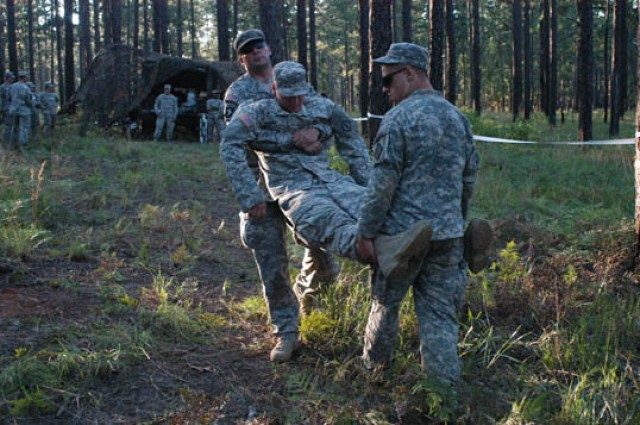
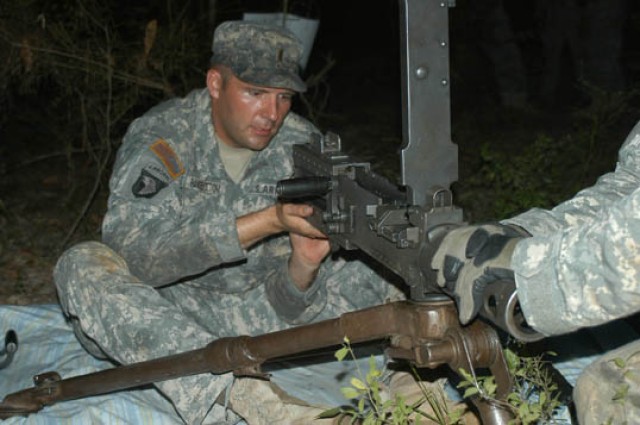
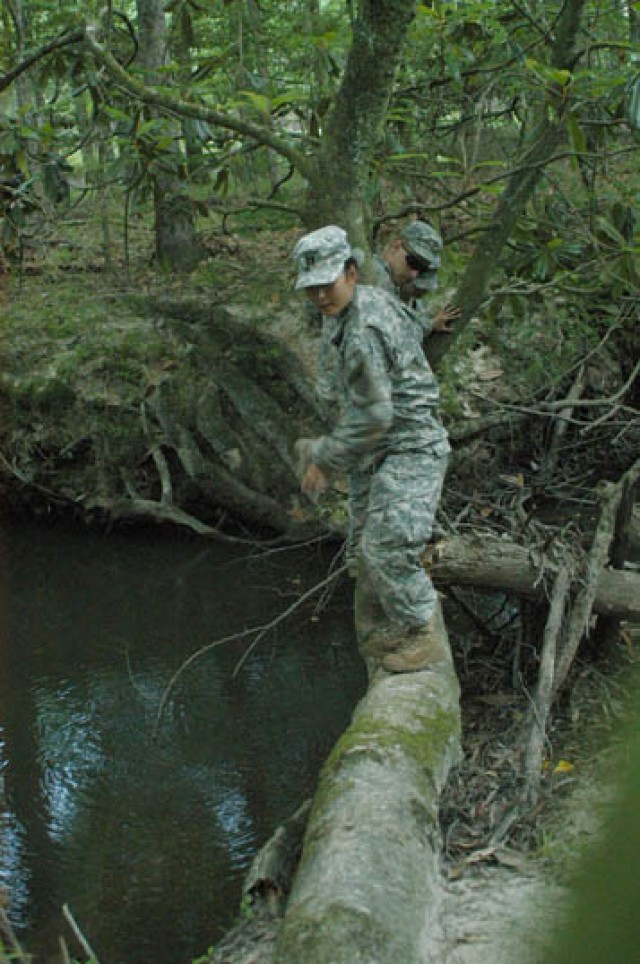
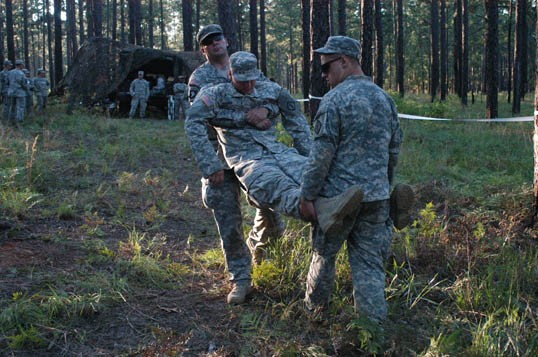
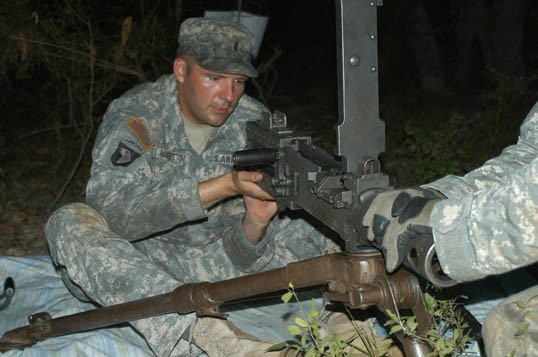
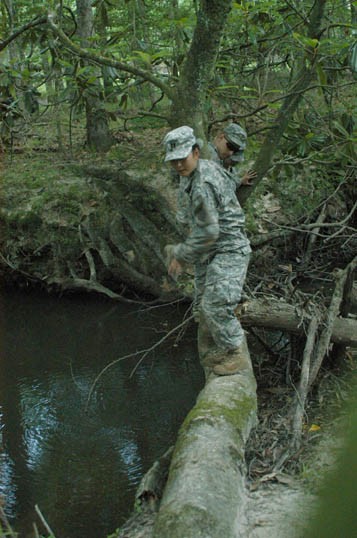
Social Sharing